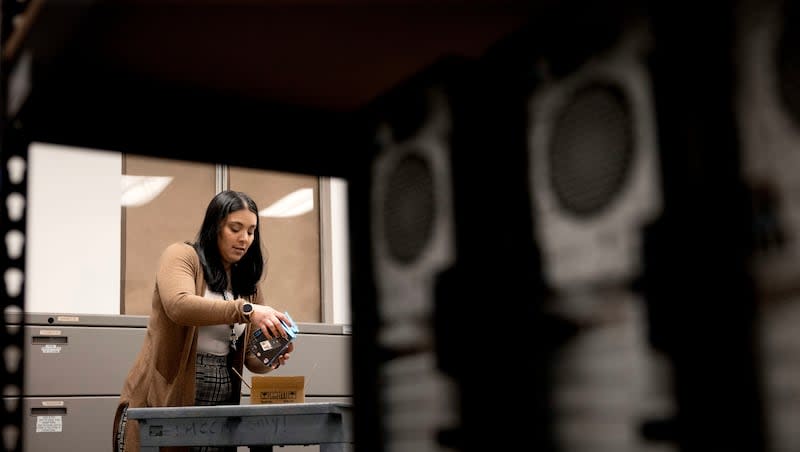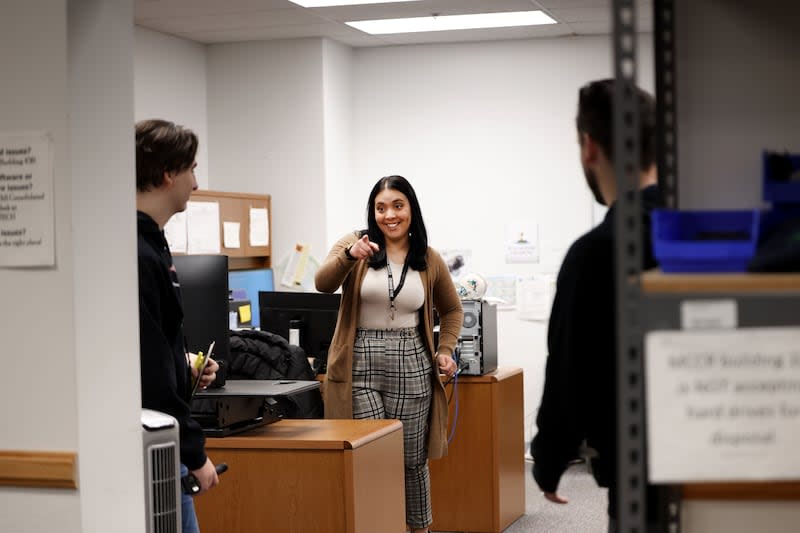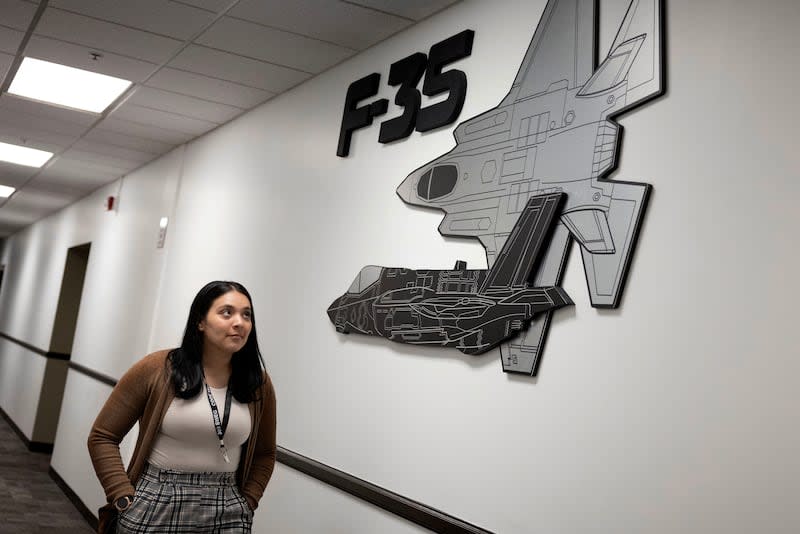How the Rosie Project is breaking barriers for military spouses in the workforce

The life of a military spouse is not easy. Military families move every two to three years on average, according to the U.S. Department of Defense, with around 200,000 to 350,000 military members living with their families internationally.
Although not a military spouse, while working as an engineer on Hill Air Force Base in Davis County, Aniza Brown saw firsthand the struggles they faced in getting hired and into meaningful positions.
Uprooting your family so often comes with many challenges, but a Clearinghouse survey found that job insecurity was the biggest challenge for military spouses between 2016 and 2020. In 2016, 38% said military spouse employment was their biggest concern, and that number has risen each year to as many as 52% in 2020.
“When you move with your active duty member, you’re having to stop everything,” Brown said. “It’s not an easy transition to keep a career, move everywhere and then be a mom or dad on top of that.”
About a year ago, Brown found herself in a position where she felt she could really make an impact on this issue, and reached out to Hill Air Force Base and Weber State, with whom she was already working on other initiatives.
When she pitched a program idea to decrease the barriers military spouses faced when finding employment, “they told me to run,” Brown said. “Start it, please, because nobody has taken this on.”
The project started out as something she would give a few hours to after work for a couple of months. “I built the website and worked with Weber State and Hill Air Force Base to build requirements, knowing that we had a massive shortage in IT,” she added. “(So) we built the requirements around information technology, and then slowly started peeling back, what barriers of entry military spouses would have.”
When it came time to post the Rosie Project online, Brown said she shared it on Facebook, knowing she would have funding for only 20 applicants. She was blown away by the response, “I posted the Rosie Project for a whole two days, and by the end of the day, we had 40 applicants.”
‘Rosie the Riveter’ in STEM
Inspired by the brave women of WWII and the iconic symbol that represented them, “This generation’s Rosies are military spouses — both male and female — who are ready to pioneer and mold the future of aerospace and defense,” the nonprofit’s website explains.
Other than being married to someone in the military, there are minor requirements for becoming a Rosie.
With funding from holiday fundraisers and companies, including America First Credit Union and OM Group Inc., they are able to provide child care and technology for each student in the program to ensure they are provided with everything they need to succeed during the six-month program.
Launched in February 2023, The Rosie Project has its classes at the Center for Continuing Education at Weber State University and is taught by instructors like Matt Paulson, who is an assistant professor at the university.
However, they intend to expand the Project to more than just Utah. Brown said the group already has plans to take the program international in 2024 to assist military spouses in Japan, Italy, Germany and the United Kingdom.
So far, the Rosie Project has had about 50 graduates complete the program and become IT certified.
But Brown said she doesn’t rank the project’s success on getting certified.
“We work so closely with aerospace and defense to fit them into positions to integrate them into the community prior to graduation. So, we don’t rank the success of the program on getting certifications. We rank it on whether or not people get jobs,” she said.

Becoming a Rosie
When her military husband came across the Rosie Project, Anabel Wyatt said she was sold on the idea immediately. While working at a call center, Wyatt said she had already developed an interest in information technology but was also looking forward to the community aspect of joining.
“I went in with hopes of meeting other spouses going through the same thing that I was going through,” Wyatt said. “You know, some places kind of give the side eye for hiring military spouses because of the uncertainty of our significant others (potentially) deploying.”
Wyatt said she’s often seen military spouses struggling to find meaningful work or are unable to find the time to work because they are also raising their children.
“It’s not easy. So I think the whole IT certification and being a part of something big, or at least in my opinion, something big — something military spouse-oriented — was what really motivated me to want to go,” she said.
Fighting imposter syndrome
One thing Brown didn’t think she would witness when starting the project was the imposter syndrome that so many of her students dealt with.
“We realized this in the first cohort when individuals were just worried to even take a task because they were worried that they were going to fail,” she said.
Oftentimes, when spouses move to a new base, the majority of them come in with college degrees and leave bagging groceries at the base exchange. Brown emphasized that she works directly with the military bases to prevent this from happening to the Rosies.
“I want to give them opportunities to identify where they want to go or connect them closer to the community,” she said. “I work with the commander spouses to really try to drive that narrative home and ensure that we’re building pathways forward, not just putting them into the on-base shop to bag groceries.”
In addition to working directly with the base, the next cohort to go through the program will have a counselor available to combat the struggles military spouses face.
“We added counseling because just in conversation with some of the military spouses, we’re identifying that there are some systemic issues that they’ve had to go through and had to overcome, and I’m not well-versed in that,” Brown said. “So I want to make sure that we get them the right support.”
According to a study by the University of Warwick’s Institute for Employment Research, “Many spouses/partners recorded perceived employer discrimination in applying for jobs, with the main reasons being: the possibility of postings and deployment in the future (35%); employment history (such as changing jobs frequently) (24%); and employer perceptions that spouses/partners are not committed (20%).”

Entering the workforce
The second cohort to go through the Rosie Project just had its graduation in January.
Deciding what her next step is, recent graduate Marisa Duarte said she is figuring it out with the help of Brown and her team, who are continuing to aid her and her classmates in finding jobs that fit their interests.
When asked what she would say to other military spouses thinking about taking the program, she said the support system it brings makes it worth it just as much as the certification does.
About two years ago, Duarte’s husband was assigned to Utah, causing her to leave her family, friends and her job behind in Pennsylvania.
“I was jobless, missing my loved ones, not knowing anybody and feeling isolated,” Duarte said. “I immediately scoured the internet in search of support for military spouses. That’s when I stumbled upon the Rosie Project, and honestly, it felt like striking gold to me.”
“The biggest thing was the support system that it builds for you (and) the chance to meet others in your same position; they’re going through the same things,” she added.
Having Brown and her team of teachers constantly advocating for her and her classmates is what Duarte said gave her the confidence to reenter the workforce:
“You know, they’re understanding, they’re helpful. They just want to help us, which is amazing.”

